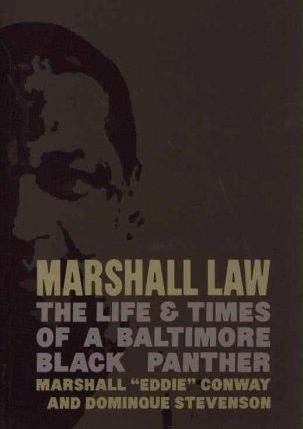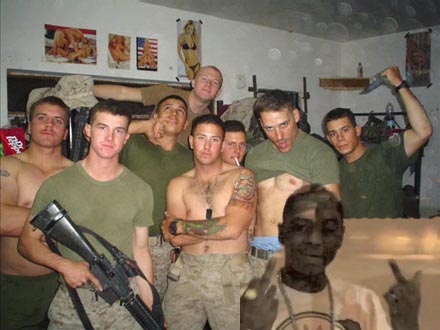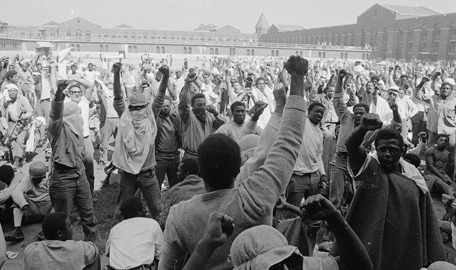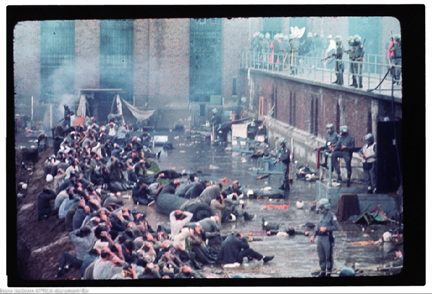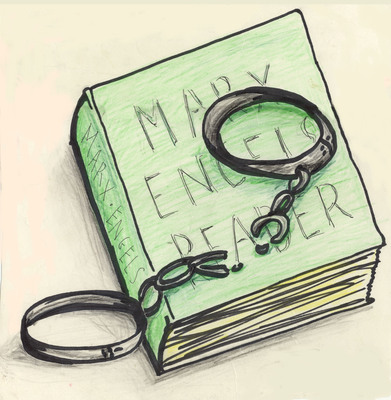
What is the Special Management Unit?
In early May 2009 over 125 prisoners of all nationalities came together for a food strike in United $tate$ penitentiary, Lewisburg, PA to protest their confinement and conditions in the newly opened Special Management Unit (SMU). Hundreds of letters were sent out to media outlets across the country and SMU prisoner family members were called who then contacted national news services. The administration conducted talks with two prisoners who were the alleged "ringleaders" of the food strike on ways to remedy the situation to try and stop the strike. Their story was never heard about on TV or in the newspaper, nor locally in the Pennsylvania paper The Daily Item.
Part of the food strike was to protest for more commissary items since the administration had refused to allow soap or shampoo to be sold on the store list. Their reasoning was that the one tiny bar of soap the correctional officers gave out once a week was sufficient. Also there were no food items, not even coffee being sold to prisoners, nor were they allowed radios in their cells or personal shoes, and a big part of the strike was to protest double bunking in the newly created Super-Max. The media didn't think this was a story since many prisoners gave in to finally eat after the administration threatened to force feed after people passed out from malnutrition. A couple prisoners were even fed intravenously by force after being cell extracted.
Family members of SMU prisoners have since created websites and chat rooms to discuss and expose the harsh procedures and conditions their loved ones are facing. The Lewisburg Prison Project has sent concerned citizens into the SMU to talk with prisoners and administrators, some of whom have recently been allowed to tour the facility and speak to Warden Bledsoe who claims the 2 plus year forced Super-Max program for the "worst of the worst" is working. The Lewisburg Prison Project has been pushing for single-cell status for prisoners like in the ADX, Florence CO to ease tensions created when two people live in such a confined area. Sometimes days will go by and cellies no longer talk to each other, they begin to plot and fight, even murder occurs in cells. Recently one prisoner strangled his cellie due to the tension within their cell.
Since the creation of the SMU multiple prisoners have suffered lung damage and gotten emphysema due to the ongoing construction to renovate the housing units after asbestos was found. USP Lewisburg was not ready to house hundreds of prisoners in 23 hour lockdown. They built recreation cages no bigger than the cells forcing 6 to 8 people to inhabit the area for exercise. Only recently have the exercise cage rules been changed to only allow 2 people at a time after the cages were called "Thunder Domes" with assaults happening daily. There is only one block, Z, with cells having their own showers, forcing most prisoners to only receive 3 showers a week. And sometimes the SMU will be put on lockdown, sack lunches are the meals for weeks, leaving prisoners hungry and bird bathing in their sinks to remain clean.
There are 4 phases prisoners must go through to successfully make it out of the SMU taking many months in each Phase to complete. In each phase certain assignments are given by workbooks from the psychology department to complete for advancement, and in turn the prisoner must not get into any kind of trouble or face the possibility of restarting the program. Like the new Federal CMU's (Communication Management Units), the SMUs are special prisons designed to isolate prisoners from the outside world. All aspects of a prisoner's life is monitored and up until phase 3 to go to recreation or medical the correctional officers must cuff the prisoners through the tray slot in the door and escort them to their destinations.
All communication is monitored, no contact visits are given until one has fully completed phase 4 and returned to general population at another USP. Up until then, in phase 1 and 2 visits are conducted via video monitor, and through glass for phase 3 and 4. Few phone calls are allowed, and photos can't be taken to send to loved ones until reaching phase 3. In such a confined space, even with cellies, prisoners become incoherent, their minds break down mentally, thoughts become confused, speech is difficult and you'll stutter and not be able to complete sentences, many go paranoid and irrational and plot against each other and fights break out due to panic and nerves breaking.
How do I know this? Because I was there! I lived through it, and experienced it first hand. Luckily I successfully completed the SMU after being their over 2 years and I'm currently in a Florida prison. Upon arrival here it literally took weeks to calm down from my anxiety being overcome with noises, crowds, people moving around and near me, and not being confined in such small spaces for hours and days on end. Just think of the prisoners who are released from Super-Max's to the streets!
The SMU's, CMU's, ADX, and other facilities like Pelican Bay for the "worst of the worst" are terrible places which destroy prisoners lives, relationships, family ties, as well as our minds. Slavery and torture exists in the United $tate$ within the prison industrial complex, especially in such programs as I luckily made it through. Please, let's shut them down!
MIM(Prisons) adds: Prisoners on food strike in California Security Housing Units will be lucky to receive the type of program that exists in Pennsylvania SMUs as a result of their current struggle. This just goes to show that reforms in these long-term isolation prisons are nothing but reforming torture. We echo the Pelican Bay prisoners' call for an abolition of torture. And ultimately, we must replace the current injustice system with one that serves the people and works to rehabilitate those who have truly committed crimes against the people.





 Alabama
Alabama
 Alaska
Alaska
 Arizona
Arizona
 Arkansas
Arkansas
 Army Post
Army Post
 California
California
 Colorado
Colorado
 Connecticut
Connecticut
 Delaware
Delaware
 District of Columbia
District of Columbia
 Federal
Federal
 Florida
Florida
 Georgia
Georgia
 Guam
Guam
 Hawaii
Hawaii
 Idaho
Idaho
 Illinois
Illinois
 Indiana
Indiana
 Iowa
Iowa
 Kansas
Kansas
 Kentucky
Kentucky
 Louisiana
Louisiana
 Maine
Maine
 Maryland
Maryland
 Massachusetts
Massachusetts
 Michigan
Michigan
 Minnesota
Minnesota
 Mississippi
Mississippi
 Missouri
Missouri
 Montana
Montana
 Nebraska
Nebraska
 Nevada
Nevada
 New Hampshire
New Hampshire
 New Jersey
New Jersey
 New Mexico
New Mexico
 New York
New York
 North Carolina
North Carolina
 North Dakota
North Dakota
 Ohio
Ohio
 Oklahoma
Oklahoma
 Oregon
Oregon
 Pennsylvania
Pennsylvania
 Puerto Rico
Puerto Rico
 Rhode Island
Rhode Island
 South Carolina
South Carolina
 South Dakota
South Dakota
 Tennessee
Tennessee
 Texas
Texas
 Utah
Utah
 Vermont
Vermont
 Virginia
Virginia
 Washington
Washington
 West Virginia
West Virginia
 Wisconsin
Wisconsin
 Wyoming
Wyoming

